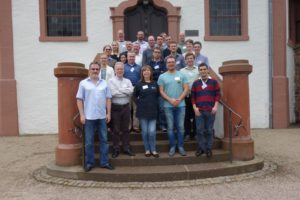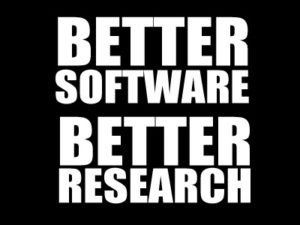Dagstuhl Seminar : Engineering Academic Software
I was recently invited to a Schloss Dagstuhl Workshop on ‘Engineering Academic Software’ by organisers Carole Goble, James Howison, Claude Kirchner and Oscar M. Nierstrasz. One week of geeking-out with research software people from all over the world in lovely surroundings with as much beer and cheese as you can eat — sounds good to me!
I gave a presentation about life on the frontline of Research Software Engineering support or the RSE Accident and Emergency department as I sometimes think of it. I spent some time discussing Sheffield’s new Research Software Engineering group formed by Paul Richmond and me off the back of our EPSRC Research Software Engineering Fellowships. I also discussed a worrying trend I’ve noticed in research software — top people are leaving academia for industry, not because they want to but because of a lack of support! Slides for my talk are at https://mikecroucher.github.io/dagstuhl_RSE_Sheffield/#/.
Highlights
I love attending seminars like this because I get to learn about all of the wonderful things that the community is up to. Personal highlights included:
Effective computation in physics
Meeting Katy Huff, co-author of my favourite Python book, Effective computation in physics. The only problem with this book is the word ‘physics’ in the title since it suggests that it’s only useful if you are a physicist. Totally not the case! If you are doing science in Python, get this book! Fellow blogger John D Cook, interviewed both authors of the book back in 2015 – see the write-up at http://www.johndcook.com/blog/2015/08/08/effective-computation-in-physics/.
Nth picture of @katyhuff with her book on Python! But this time it’s the special signed #dagstuhleas 2016 Edition pic.twitter.com/FG8O4nOLSR
— d(-.-)b (@katerererena) June 23, 2016
Software Heritage
Learning about the Software Heritage project that launched very recently. The project harvests and archives projects from various locations — github, Debian and the GNU Project for now. They say that ‘we preserve software, because it contains our technical and scientific knowledge.’ It’s shaping up to be a ‘Library of Alexandria of Software’. The full mission statement is over at https://www.softwareheritage.org/mission/
Software citation and credit
There was a lot of discussion about considering software as a first class scientific output and several projects were mentioned that help the situation. The force11 software citation principles address how software should be cited and depsy.org is ‘an open-source webapp that tracks research software impact‘. Dan Katz’s blog post ‘How should we add citations inside software‘ is also worth a read.
What did we talk about?
Many of the participants are active on Twitter so there was a lot of live tweeting. The twitter hashtag for the workshop was #dagstuhleas. It’s been hijacked by spammers recently but there is a lot of great content there – https://twitter.com/search?q=dagstuhleas&src=typd
Elsewhere…
I’m not the only attendee to write about this workshop:
Alice Allen of the Astrophysics Source Code Library has written up a day by day account of the workshop in a way that captures what it’s like to attend a Dagstuhl seminar perfectly.
- Engineering Academic Software at Schloss Dagstuhl – Introduction
- Engineering Academic Software, Schloss Dagstuhl Day 1
- Engineering Academic Software, Schloss Dagstuhl Day 2
- Engineering Academic Software, Schloss Dagstuhl Day 3
- Engineering Academic Software, Schloss Dagstuhl Day 4
The Software Sustainability Institute was also present in force. See what they had to say over at http://www.software.ac.uk/blog/2016-07-06-dagstuhl-perspectives-workshop-engineering-academic-software
Slides for all presentations can be found at http://materials.dagstuhl.de/index.php?semnr=16252




